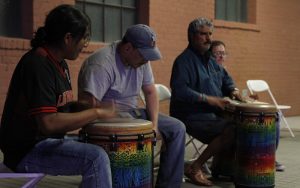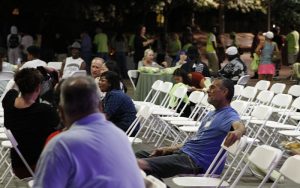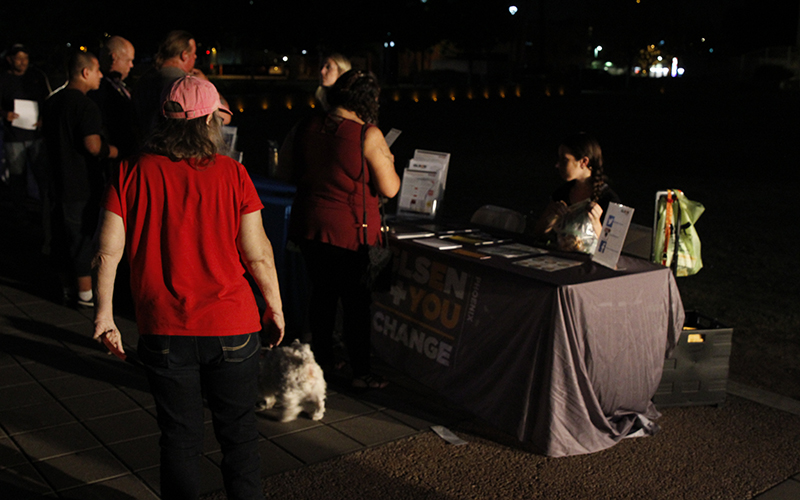PHOENIX — “Let’s all take one deep breath together, and I’d like you to turn to the person to the left, or right of you and I’d like you to say to them, ‘I’m glad you’re here and I will not forget this moment,'” said Jenny McLellan, in front of those who attended the 22nd Annual Candlelight Celebration for Mental Health Awareness in downtown Phoenix.
McLellan, a representative of the Mental Health Awareness Coalition, asked the audience to “embrace the journey,” which was also the theme of this year’s celebration.
A celebration at times marked by the stigma that comes with mental illness.

Members of the PSA Art Awakenings perform drum group perform during the candlelight celebration. (Photo by Lysandra Marquez/Cronkite News)
The subject has come to the forefront of the national conversation in the last decade, after shootings like those committed by Jared Loughner, who shot U.S. Rep. Gabrielle Giffords in Tucson, and Adam Lanza, who shot and killed 20 children in Newtown, Connecticut.
Terry McDermott, education coordinator with the National Alliance on Mental Illness, shared his own journey, one which entailed confronting suicide.
“My father died by suicide when I was 30 years old, and that was when my suicidal issues started, and nobody ever knew it, and every time I’d become suicidal I would think about a plan. I never had a clue that maybe there was mental illness involved with that,” McDermott said.
It took an intervention from his son, a police officer, and an ensuing hospitalization to get McDermott the help he needed, including joining a peer support group.
Thursday’s event was hosted by the Arizona State University Center for Applied Behavioral Health Policy and the Mental Health Awareness Coalition.
While events like this help shed a light on the multiple resources available to Valley residents, statistics show Arizona still ranks 40th in the country when it comes to the accessibility of mental health care, according to a 2016 study conducted by Mental Health America.
Some of the indicators used to measure accessibility included cost of insurance, healthcare coverage, and workforce availability.
The estimated 250 attendees had the opportunity to walk around Civic Space Park and visit with representatives of many different organizations, groups and resources available to Maricopa County residents.
One of those organizations was Valle Del Sol, which offers an integrated approach to behavioral and social services.
Arbita Ferozepurwalla, a director at Valle del Sol, believes that while Arizona has improved when it comes to offering resources tailored toward mental health, it is also important to expose community to the available options.
“Holding some of these events are great, having this happen more often, making everyone in the community aware is really important, and also being in different neighborhoods,” she said.
Ferozepurwalla did say, however, there’s still progress to be made toward de-stigmatizing mental illness.
“Some of it has to do with lack of education others have around mental health in general, whether it has to do with health issues, substance abuse, serious mental illness. But also I think it has a lot to do with health literacy,” she said, adding that events like the candlelight celebration are a step toward improvement.
Throughout the park, attendees scattered and sat in groups, some of them sharing their own personal accounts of survival, and offering words of encouragement to each other while they shared a meal.
Kate Coakley, a Valley resident, echoed Ferozepurwalla in the need for education to get people familiar with what mental illness means.
“I think there’s not enough education about mental illness and for someone who hasn’t experienced it, or has a loved one that has an illness, it could be frightening. If you don’t understand the symptoms and if you don’t understand the recovery, it can be scary,” she said.
Four years ago, Coakley received multiple diagnoses, including Bipolar I and Post-Traumatic Stress Disorder. At the time, it was her first encounter with mental illness.
“When I was first diagnosed, I didn’t know anybody that had a mental illness and I had a really big reaction to hearing it,” she said, adding the candlelight celebration put her own recovery into perspective.
Next to Coakley sat Anthony Perez, who lost his wife to bone cancer a couple of years ago.
Perez recounted how he found it difficult to continue his own life without her and considered ending his life. He checked himself into a hospital and received the help he was seeking.
Now, he wants to help others who find themselves in a position similar to his.
“Take your time, day by day, like I did,” he said, adding, “If it wasn’t for God, and for these places helping me out, I would never have made it.”
Toward the end of the night, Liz Smithhart, with Recovery Empowerment Network, announced it was time for the candlelight ceremony.
Walking to the front of the stage, Smithhart offered participants a microphone so they could say the names of those they wanted to honor.
Many acknowledged their own journeys, while others remembered friends, family and loved ones who had taken their lives or were dealing with mental illness.
With glow sticks shining against the dark night, everyone in attendance joined in to sing “Lean on Me.”
For those looking to get help, whether it’s for themselves or loved ones, Tiffani Cullin, a social worker in Phoenix, said 211 Arizona is a valuable tool when it comes to services including disability related resources, mental health and support groups.

Attendees of the 22nd Annual Candlelight Celebration for Mental Health sit together and, while others line up behind them to enjoy the free food. (Photo by Lysandra Marquez/Cronkite News)
Cullin shared that when encountering a situation with an individual in mental distress, if it’s necessary to call police, specify the need for an officer with Crisis Intervention Training.
Ted Williams, with the Arizona Behavioral Health Corporation, shared one of the most common misconceptions about those dealing with mental illness.
“There’s a belief that people with mental health issues may not be bright, or may not have the ability to change, and all of those are false. When people get the appropriate care, and they’re in safe place, they can thrive,” he said.
